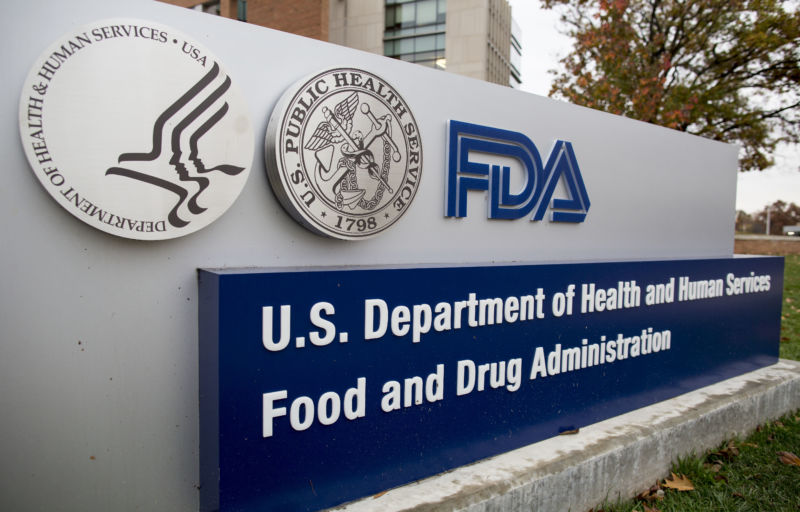Reversal —
FDA now says drug should only go to those with mild disease—the only patients tested.
Beth Mole
–

Enlarge / The Food and Drug Administration headquarters in White Oak, Maryland.
Update 7/9/2021, 2:35 pm ET: The Acting Commissioner of the Food and Drug Administration sent a letter to the Office of the Inspector General Friday calling for an independent review of the agency’s controversial approval of the Alzheimer’s drug Aduhelm.
“I believe that it is critical that the events at issue be reviewed by an independent body such as the Office of the Inspector General in order to determine whether any interactions that occurred between Biogen and FDA review staff were inconsistent with FDA policies and procedures,” Acting Commissioner Janet Woodcock wrote in the letter, which was addressed to acting Inspector General Christi Grimm.
In explaining the call for the investigation, Woodcock cited the “significant attention” and concerns raised by the agency’s decision to approve the drug. It is “inevitable” that some FDA decisions lead to controversy, she wrote, and “I have tremendous confidence in the integrity of the staff and leadership” involved in the decision. But, a review is necessary, she added, because the mounting concerns could “undermine the public’s confidence in the FDA’s decision.”
The original story follows.
Original Story: 7/9/2021, 12:42pm ET:
Less than five weeks after granting a highly controversial approval for the Alzheimer’s drug Aduhelm, the Food and Drug Administration has updated its recommendation for who should receive the drug. The update narrows the recommended patient pool from all those with Alzheimer’s disease to only those with mild forms of the disease.
The FDA’s initial sweeping recommendation was a highly contentious aspect of the drug’s approval, because it wasn’t backed by any data. Aduhelm’s developer, Biogen, had only included people with mild disease in its clinical trials. The numerous critics of the approval raised immediate questions as to why the drug would be open to all.
But those critics—including researchers and industry experts—aimed most of their ire at the approval itself, given that Biogen’s clinical trials failed to convincingly show that the drug works at treating mild Alzheimer’s. In fact, Biogen had halted two identically designed Phase III trials in 2019 after Aduhelm flunked a “futility analysis.”
In a surprising resurrection later that year, Biogen touted that a subset of trial participants receiving a high dose of the drug in just one of the abandoned trials showed a slight improvement on cognitive tests compared with a placebo group. Participants in the other identical trial, however, clearly saw no benefit. Still, Biogen submitted its ad hoc analysis of the defunct trials to the FDA. Biostatisticians at the agency outright rejected Biogen’s claims of efficacy, and a panel of independent expert advisers for the agency voted overwhelmingly against approval (10 of 11 voted against, one voted “uncertain”).
Nevertheless, the FDA announced Aduhelm’s approval June 7. Though agency officials acknowledged at the time that there is “some uncertainty about the drug’s clinical benefit,” they granted approval based on a “surrogate endpoint.” That is, the FDA approval was based not on efficacy, but rather on data that the drug appeared capable of clearing amyloid beta plaques from the brains of some Alzheimer’s patients.
Though the plaques are associated with Alzheimer’s, it’s unclear if they are the root cause of the disease and if clearing them provides benefit. Trials of other experimental Alzheimer’s drugs have found no correlation between plaque clearance and cognitive improvement.
Backlash
Critics quickly called the approval “disgraceful” and “dangerous.” Three members of the agency’s advisory panel resigned in protest. Watchdog group Public Citizen called for the ouster of three top FDA officials.
Adding fuel to the fiery criticism is Biogen’s decision to price Aduhelm at $56,000 for a year’s supply. One analysis estimated that if the country’s 5.8 million Medicare-eligible adults with Alzheimer’s began taking Aduhelm, it could cost the federal insurance program $334.5 billion a year. In 2019, Medicare spent a total $37 billion for all drugs in the same category as Aduhelm, which is a doctor-administered drug. And the eye-popping cost estimate does not include additional, pricy brain scans and safety monitoring that taking the drug would require. While Aduhelm’s efficacy is uncertain, the drug’s known side effects include dangerous brain swelling and bleeding.
The FDA’s update to narrow the potential patient pool will bring down those cost estimates. But perhaps not by much. A recent study led by researchers at Boston University estimated that half of people living with Alzheimer’s could be categorized as having mild disease. And, even if just 500,000 Medicare beneficiaries end up taking Aduhelm, it could still cost the federal government $29 billion a year.
The update—awkwardly coming so soon after the initial approval—also raises further questions about how the FDA made its decision on Aduhelm. Already, Sens. Bill Cassidy, MD (R-La.) and Elizabeth Warren (D-Mass.) have called for a hearing on the drug. And the House Committee on Oversight and Reform has opened an investigation on its approval and pricing.
In a statement Thursday, Biogen’s head of research and development, Alfred Sandrock, Jr., said that the FDA’s update was “based on our ongoing conversations with prescribing physicians, FDA and patient advocates,” and would “further clarify the patient population that was studied.”

